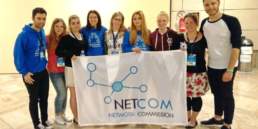The hottest topic of the Agora Rhein-Neckar in three weeks will be the Network Regions proposal. The CD would like to re-introduce a division of the network into ten regions, something that AEGEE had from 1997 until 2006. However, different from that time, the CD wants to fix the borders of the regions for three years. This would lead to the development of a regional identity and even to a regional level, expect critics. Also the current Network Commission does not support the proposal. NetCom speaker Wieke van der Kroef told the Golden Times why.
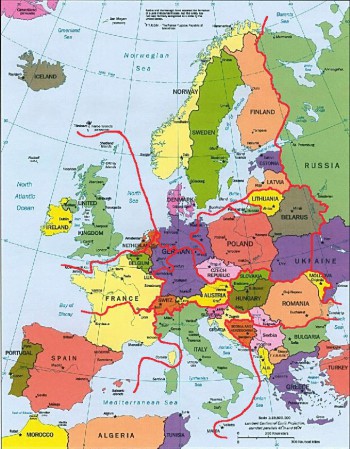
Golden Times: Wieke, at the Agora the CD will present a proposal for a Network Commission reform. Main element will be the creation of regions with fixed boundaries for three years. What do you think about the idea?
Wieke van der Kroef: The current system is showing flaws – and I believe that if something is far from perfect you need to look for a better way. So I support the fact that this Comité Directeur does that, but I must say that in my eyes regions are even farther from the right solution. They have existed and been deleted before, so we need to use the knowledge of this previous experience when making decisions now. We need to look at the good practices of some areas and see how we can apply them in others, without having to draw lines.
Golden Times: How is the NetCom discussing the plan? Is there a majority in favour or against it?
Wieke: With the team we have been following the discussion among former Network Commissioners and CD on the NetCom-Ghosts-L mailing list, as well as discussing amongst ourselves on this matter. From the moment Beáta shared the proposal with us – just before the deadline – we have had a constant discussion where almost everyone gave his or her opinion on the matter. Even after the proposals were split into one about Network regions and one about the separate election of the NetCom speaker, there is still a clear majority that does not support either of the proposals as they will be presented at the Agora.
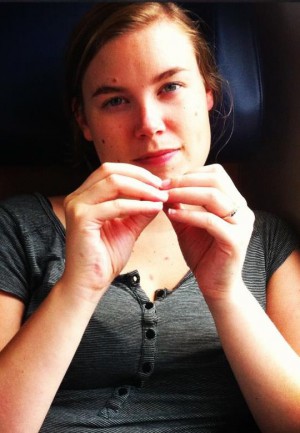
Golden Times: Was the Network Commission involved in drafting this plan?
Wieke: That depends on what you would consider the drafting of the plan. The CD has been working on this matter since the beginning of their period – it is point 27 in the Activity Plan. They have asked for our opinion a couple of times, one of them being at Agora Budapest where we had an interesting and constructive discussion on the matter. Of course they also asked us to communicate their survey to the locals. In the Activity Plan you can see that the initial idea was to also discuss this matter at the fall Network Meetings. As the survey was not sent yet and there were no specific points to discuss it we decided to move it to the spring NWMs, also because the CD said they would not draft a proposal for the Spring Agora on this.
Golden Times: And that changed…
Wieke: In the writing of the actual proposal for the CIA change in Agora Rhein-Neckar, we have been involved just a few days before they handed in the first version of the proposal to see if we wanted to co-propose the change. Since most Network Commissioners had strong opposing ideas on important parts of the proposal, we did not need to have a vote to decide that we could not present the proposal. Splitting the proposal into two parts has been done after this discussion and our decision.
Golden Times: You mentioned the survey that the CD made regarding the re-introduction of fixed regions. Nearly two third of the locals were in favour, but only 32 locals took part. Which value has this survey for you?
Wieke: Well, as a student I like to look at the statistics, 32 locals responded, that is 17 per cent of the total amount of 187 locals in our network at the moment. There were 20 that agreed which is about 11 per cent. Plus you can ask yourself the question how many of them have really had an internal discussion about this with more than just board members? My guess is not a lot and that means that there are few informed choices here and the recommendation they give is very weak. Too weak to base policy on, so any use of these statistics as proof of the general opinion in AEGEE is trying to provide an idea with an artificial democratic base.
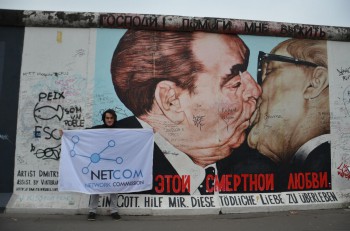
Golden Times: So you will make the topic part of the upcoming Network Meetings?
Wieke: Yes, we will present this topic at the Spring Network Meetings. We will try to invite experienced members to help us present the discussion and the different arguments to the members so they can have an informed discussion. Hopefully this will lead to having members in almost all locals that have a more informed opinion on this important topic.
Golden Times: Currently the Network Commissioners often are in charge of random and not coherent areas, such as Romania and Greece, but not Bulgaria in between. Doesn’t that show that the current system needs improvement and change?
Wieke: The current system can most definitely use a change and more than the standard ‘there is always room for change’, if you ask me. Being a student association with a high turnover rate, creating stability and a good knowledge transfer is very hard but essential. A way in which we have been trying to improve this the last two terms, is by creating teams of subcommissioners for all areas.
Golden Times: How is that helping?
Wieke: Having subcoms taking over from the previous commissioners creates more stability in the area, plus it ensures a better knowledge transfer. Having subcommissioners even makes it possible to keep smaller groups of locals that are geographically close and a coherent group together even when they have to change to another ‘area’ or ‘region’. Changing regions is still not preferred even in those situations, but it will affect locals less directly and it will not interrupt stability as much. So drawing lines, designing three-year borders, is not the only way to improve the current system. As these things are not the only way and in the past have been proven to be imperfect as well, since they created regional identities that clashed with our European dream, I think it is not the direction we should let the CD take AEGEE.
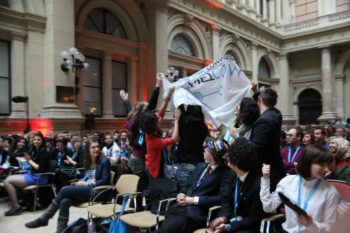
Golden Times: Wouldn’t more coherent regions, which stay together over several years create a stronger cooperation of locals within a region? And wouldn’t that also make more competent Network Commissioners because of better knowledge transfer within a more coherent region?
Wieke: To both I would say not necessarily. I think stronger cooperation within regions is a possible result of creating regions, but the only experience of cooperation I have is in areas that developed it themselves. The result can be different when regions are forced on areas not already working together. I believe having subcom teams also ensures better knowledge transfer and it ensures cohesion. So we do not require fixed regions in order to get better Commissioners and more coherent regions, we just have to change some working methods within the NetCom.
Golden Times: Some people say that the proposal is not good, because the fact that AEGEE knows only a local and European level is a cornerstone of AEGEE. But is such a dogma worth it, if you give up practical advantages by having strong regions?
Wieke: The simple fact that we are now discussing this in AEGEE means that we are questioning this ‘dogma’. In essence this makes it no longer generally accepted ergo not a dogma. People sometimes complain that we repeat discussions from the past, but I always believe it to be a good thing because it keeps you aware of the arguments that are behind statements we make. I will repeat what I said in the beginning: if something is far from perfect you need to look for a better way. This means going over all options again in order to find the best solution. The question I have been asking myself throughout this discussion is, is it possible to keep the practical advantages without having to design three-year borders? I believe it is. With the installation of subcom teams, a mandatory training for Network Commissioners at the start of their period, and a clear advise to every new NetCom team to try and keep locals together when a new distribution is made. It might not be the easiest way, but our European identity is the basis of everything and giving that up, even a little by installing regions, is too big a loss for a small gain in comfort.
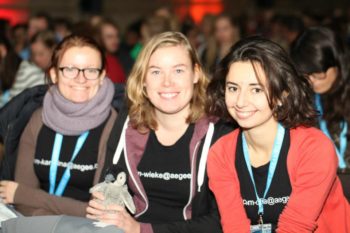
Golden Times: Koen Berghuis said: “A regional level will take away much freedom for locals to truely engage in real European partnerships of their choice”. Isn’t that exaggerated?
Wieke: Yes it is, having regions is not preventing locals from engaging in a cooperation that goes beyond their region and therefore does not touch upon their freedom. The difference is that it is probably easier to stay within the region and I think that Koen fears that locals will be tempted to almost exclusively use this simple way – something not unthinkable for anyone who has had the experience of being a Network Commissioner. I however believe that AEGEE will always attract people that want to travel and as long as we find ways to reach those people and inspire them we can overcome any border. But Koen is right in the sense that it might happen that there will be less cross-regional cooperation. Which would be a significant step back, one we need to take into account when evaluating the idea of re-installing regions.
Golden Times: Wieke, you are from the Netherlands, where with the Nedertop meetings you actually sort of have a national or regional level. Wouldn’t create regions with fixed borders democratise quasi-existing regions?
Wieke: Nedertops are meetings of the boards of Dutch-speaking locals – so including the Flemish – to exchange knowledge and experience and work on shared projects. The fact that these meetings exist in the current structure to me is the ultimate proof that we do not need to start a region in order to promote intra-local cooperation in a coherent area. The thing about the Nedertop is that it is easy since the locals are all so close to one another – the furthest is four hours by train. So having regular meetings is relatively easy. This is the basis of my idea that small subsections of areas should have their own subcom, as that can stimulate cooperation by having them travel often to the other locals, no matter what borders our governments have drawn between locals.
Golden Times: So more cooperation is possible without a CIA change?
Wieke: We should use this discussion to try and understand these kinds of cooperation between locals that are geographically close and coherent so we can start more of them. Having these cooperations is something different than starting a regional level and force it on regions that have not yet started cooperating by themselves. The fact that they have not started might not be because they have not been in an unchanged region for three years, but because of cultural, historical or other reasons. Cooperation only works if both parties are ready and willing, it cannot be forced, definitely not by creating borders.
Golden Times: Are you concerned that the proposal might open Pandora’s box by shifting more and more compentences and decisions on a regional level in the next years?
Wieke: Yes. It will not happen in the first years, when we are still aware of this discussion on the dangers of this regional level, but over time Network Commissioners will start to only feel a responsibility towards their own region. You will realise that this is problematic when you look at the role the Network Commissioner has, it is the communicator between the European and local level. This means that they need to know and be aware of both the local and European level. If they do not understand the European level they can never inspire their locals to get involved in it. Not being able to inspire locals will mean losing the connections that keep our association together. This will not happen immediately, but I do believe this is dangerous but possible scenario when regions are installed. We don’t need regions to improve the cooperation, we need subcom teams and an obligatory training for Network Commissioners.
See also this related article: Ex-NetCommies: “Network Regions Would Ruin AEGEE’s Character”

